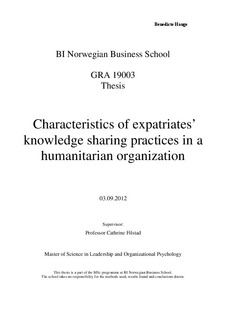Characteristics of expatriates' knowledge sharing practices in a humanitarian organization
Master thesis
Permanent lenke
http://hdl.handle.net/11250/95006Utgivelsesdato
2013-02-12Metadata
Vis full innførselSamlinger
- Master of Science [1621]
Sammendrag
The topic of this thesis is to examine how expatriates, that is, people taking employment outside one’s native country, contribute to organizational learning, and what the characteristics of their knowledge sharing practices are. The study of these issues is conducted through 7 qualitative interviews with expatriates working in a Norwegian, humanitarian, individual, non-profit, non-governmental organization. In the discussion, five central characteristics of expatriates’ knowledge sharing practices are studied. First, the focus is on how they become qualified for working in the humanitarian sector through formal education and practicing with colleagues. Secondly, it is argued that the organizational culture hinders knowledge sharing as learning and knowledge boundaries. Thirdly, the emphasis is on the knowledge goals and how these affect sharing of knowledge that is either of an explicit or tacit character. Fourth, the impact of trusting, social relationships is analyzed and how such relationships either facilitate for, or hamper knowledge sharing, and the formation of communities of practice. Finally, the role of decision making structures is examined and how organizational structures obstruct knowledge sharing. The thesis concludes that expatriates contribute to organizational learning to a low extent, because of individual ownership of culture, lack of knowledge goals and trusting relationships together with hierarchical organizational structures. Thus, the expatriates’ knowledge remains an untapped, valuable resource in the organization.
Beskrivelse
Masteroppgave(MSc) in Master of Science in Leadership and Organizational Psychology - Handelshøyskolen BI, 2013
